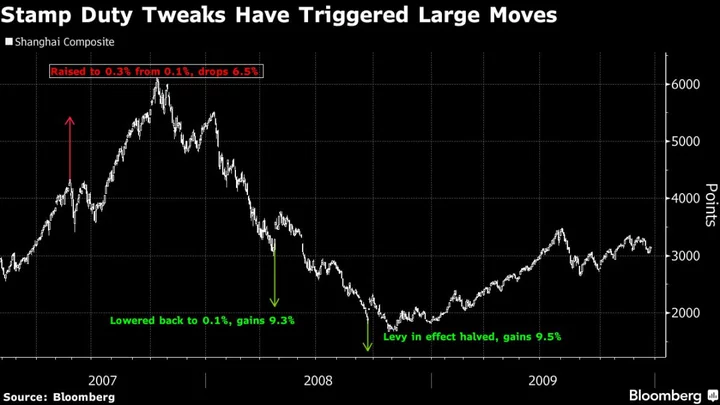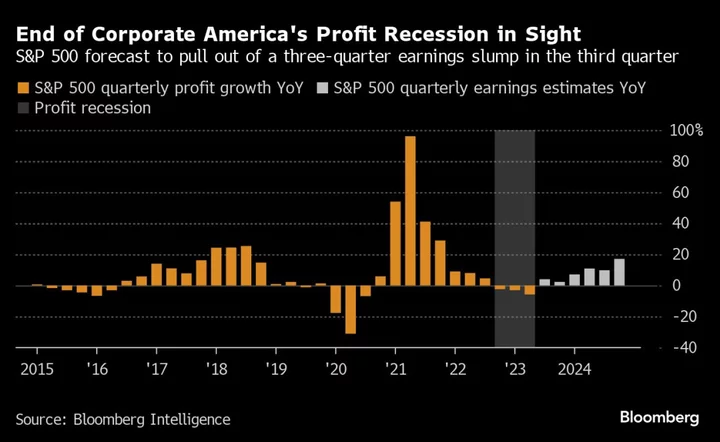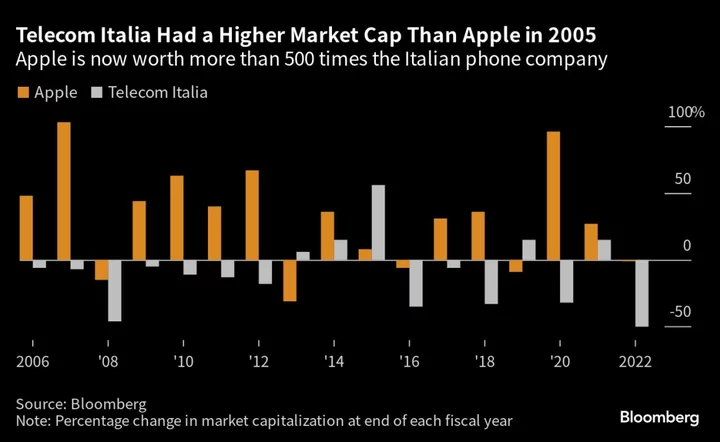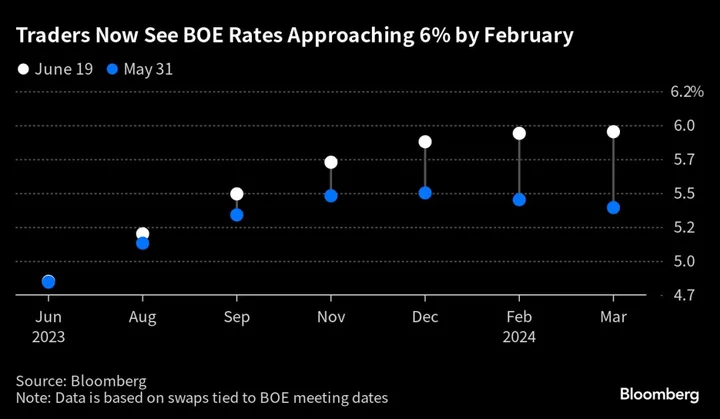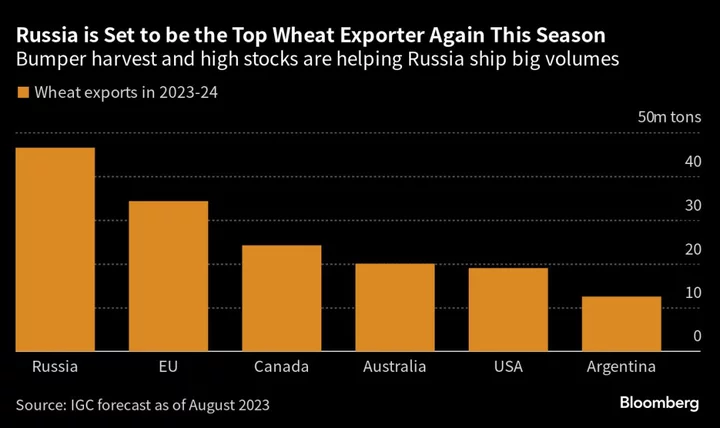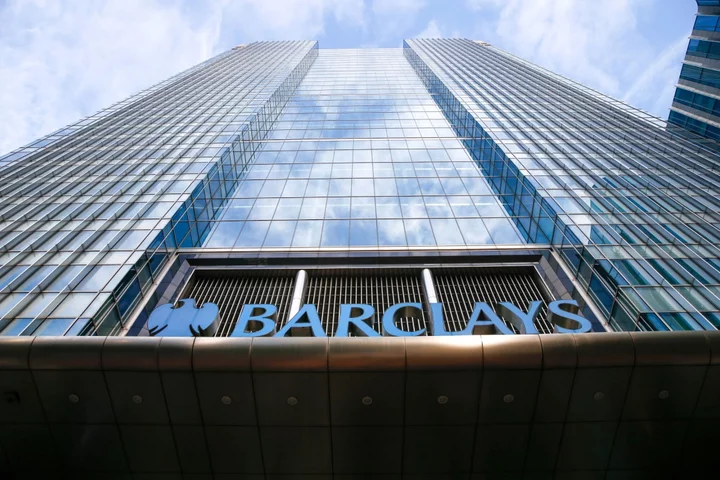Chinese stocks surged at the open Monday after authorities took a raft of steps to bring investors back to one of the world’s worst-performing equity markets. But most of the gains were gone by the end of the session, with foreign funds extending what’s set to be a record outflow this month.
The price action illustrated once again how China’s efforts to boost its markets are struggling in the face of economic worries. Data Sunday showed industrial profits slid 6.7% in July from a year ago, adding to signs that the recovery lost further momentum. While calls for broad stimulus are mounting, authorities have held back given their determination to shift away from the debt-fueled growth model.
Opening with a 5.5% pop in response to weekend measures that included the first cut in stamp duty since 2008 as well as curbs on share sales by major stakeholders, the CSI 300 Index of onshore Chinese stocks finished just 1.2% higher.
“The measures over the past weekend are not enough to stem the downward spiral” and their impact will be short lived if not followed by measures for supporting the real economy, Ting Lu, chief China economist at Nomura Holdings Inc., wrote in a note. “Without additional and more aggressive policy stimulus, these stock-markets-focused policies alone have little sustainable positive impact.”
Echoing similar views, Neo Wang, Evercore ISI’s New York-based managing director for China Research, said that a turnaround in the A-share market would not happen unless Beijing adopts more “bazooka” measures, such as the 4-trillion yuan ($548 billion) stimulus package it rolled out in 2008.
READ: Run It Cold: Why Xi Jinping Is Letting China’s Economy Flail
But expectations for such a response seem low. China will refrain from launching a really big, bazooka-like stimulus and instead employ moderate measures, according to 57% of 455 respondents in the Markets Live Pulse survey conducted Aug. 21-25 globally among Bloomberg News readers on the terminal and online.
Meanwhile, Beijing’s continuous efforts to revive investor confidence suggest the slump in Chinese equities has reached a level that policymakers can no longer turn a blind eye to. As households suffer from a shrinking wealth effect from China’s property crisis, invigorating capital markets has become even more crucial.
Other measures announced Sunday included a cut in deposit ratios for margin financing as well as a pledge by the China Securities Regulatory Commission to slow the pace of initial public offerings. The raft of changes this time are expected to bring the equivalent of 750 billion yuan of new funds into the market per year, according to estimates from Huatai Securities.
READ: Everything China Is Doing to Juice Its Flagging Economy
Equity traders had been expecting more forceful steps after recent efforts by authorities failed to arrest the market’s slide. Stock exchanges asked some mutual funds to avoid selling equities on a net basis, Bloomberg News reported late on Monday, citing people who asked not to be identified discussing private information.
“The open today was a bit too strong, and that level of hype understandably leads to some people walking away from the table,” said Lin Menghan, a fund manager at Shanghai Xiejie Asset Management Co. “The measures overall addressed the issues of outflow and dilution of funds in the market, rather than where the fresh liquidity will come from.”
The CSI 300’s reversal on Monday marked a rare occurrence. There have been only three past occasions since 2004 when the equity index soared over 5 percentage points and then pared the gain by 4 percentage points. While history shows that the gauge often recovered in the week and month after such volatility, the index fell over the following 60 days in two of the three past instances.
READ: China Stock Measures Hard to Sustain Market in Long Run, MS Says
Global Funds
The Hang Seng China Enterprises Index surged as much as 4.1% before ending the day 1.2% higher. While the gains helped pare its losses for August to under 10%, the gauge of Chinese shares listed in Hong Kong is still one of the world’s worst performers among more than 90 equity gauges tracked by Bloomberg. The CSI 300 is down 6.5% this month.
While Beijing has been taking steps to lift market sentiment, foreign investors seem to be focused on the country’s economic slowdown. Global funds on Monday sold the equivalent of $1.1 billion of mainland shares on a net basis via trading links with Hong Kong, according to data compiled by Bloomberg. That took outflows for August to over $11 billion, poised to be a record.
The market’s response to stimulus measures is also becoming increasingly muted. On Friday, the unveiling of property stimulus measures sparked an initial flurry of buying, with China’s benchmark CSI 300 Index reversing losses. However, the gauge resumed declines after about 10 minutes and ended the day down 0.4%.
A gauge of onshore Chinese brokers soared 9.7% early on Monday following the stamp duty reduction, but ended the session just 2.2% higher.
China last cut the stamp duty in April 2008, triggering a 9.3% rally in the Shanghai Composite in the following session. In May 2007, authorities had raised the rate to 0.3% to cool a rally that was drawing more than 300,000 new investors a day.
The cut in duty “shows the urgency for policymakers to turn around market sentiment, but last time this was followed by massive stimulus, which may not be the case this time around,” said Marvin Chen, an analyst for Bloomberg Intelligence. “The key for a sustained re-rating is still turning around economic growth momentum, and more policy support will be needed.”
China’s 10-year government bond yield gained two basis points on Monday, after earlier rising five basis points on bets some investors will likely switch to equities from bonds. The offshore yuan rose as much as 0.3% before erasing almost all of its gain.
The PBOC set its daily reference rate for the yuan at its strongest since mid-August, continuing a trend of more robust-than-expected fixings for the managed currency. It also injected the most amount of short-term cash to the financial system since February, a measure likely aimed at managing month-end liquidity needs.
“Economic fundamentals, as reflected in the cyclical asset prices, have so far failed to respond to policies as they used to. More needs to be done, and will be,” Hao Hong, chief economist at Grow Investment Group, wrote in a note. The sentiment boost from the stamp duty cut “will be fleeting, but its policy intent should not be unheeded,” he added.
--With assistance from Jacob Gu, Iris Ouyang, Wenjin Lv, Zhu Lin and Abhishek Vishnoi.
(Adds more details via paragraphs six and eleven.)

